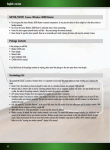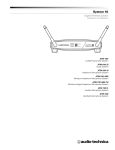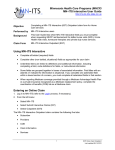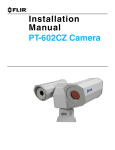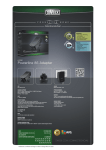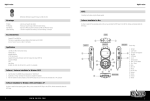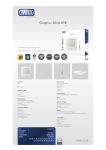Download Sweex Broadband Router
Transcript
English version RO002/RO002UK Sweex Broadband Router Introduction • • • • Do not expose the Sweex Broadband Router to extreme temperatures. Do not place the product in direct sunlight or in the direct vicinity of heating elements. Do not use the Sweex Broadband Router in extremely dusty or moist surroundings. Protect the product against powerful shocks or jolts - they may damage the internal electronics. Never attempt to open the product yourself - it will cause the warranty to lapse. Front view Status Meaning Off No device is connected to this port LAN1x t/m 4x On A computer or other network device is connected to this port Blinking Data traffic is exchanged between the router and the connected device WAN Off The router is not or not correctly connected to the internet modem On The router is connected to the internet modem English version Rear view 1 2 3 4 WAN RESET AC 9V 1. LAN ports 1, 2, 3 and 4 for connecting computers by means of an RJ-45 UTP Ethernet network cable. 2. WAN port for connecting a modem by means of a RJ-45 UTP Ethernet network cable. 3. Reset button to return to the factory settings. 4. Power connector for connecting the power adaptor. Connecting the Sweex Broadband Router 1. Connect the power adaptor (included) to the rear of the router and the mains socket. The light next to “Power” is lit. In the event the LED is not lit, check the connections of the power adaptor to the router and the mains socket. 2. Switch on the computer and connect it to the rear of the modem using a network cable (RJ-45 UTP). You can select any of the ports 1, 2, 3 and 4. The corresponding light at the front will be lit. In the event the light fails to light up, check whether the network cable is properly connected to the computer and the router. 3. Switch on the modem* again. Note: Here we do not refer to the Sweex router. Connect the modem to the rear of the router using a network cable (RJ-45 UTP). Do this via the WAN port The WAN light at the front of the router will light up. In the event the light fails to light up, check whether the network cable is properly connected to the router and the modem. * In order to use the Sweex Broadband Router you need an active Internet connection, which is established through a modem. This modem is usually supplied by the provider. English version Configuring the computer to connect to the router Windows Vista In the bottom left of your screen, go to “Start” (Start) “Control Panel” (Control Panel). Click on “View network status and tasks” (View network status and tasks). English version Left in the column, click on “Manage network connections” (Manage network connections). Right-click “LAN Connection” (LAN Connection) or “Wireless Network connection” (Wireless Network connection) and select “Properties” (Properties). The following screen appears: Now select “Internet Protocol Version 4 (TCP/IPv4)” and click “Properties” (Properties). English version Select the options “Obtain an IP address automatically” (Obtain an IP address automatically) and “Obtain DNS server address automatically” (Obtain DNS server address automatically). Confirm the settings by clicking “OK”. The network settings have now been configured correctly for Vista. The correct settings for the Internet browser will be discussed later in this manual. Windows XP In the bottom left of your screen, go to “Start” “Control Panel” Then go to “Network and Internet Connections”. Open “Network Connections”. Or, if the Windows classic style is used: “Start” “Settings” “Network Connections”. Right-click “LAN Connection” or “Wireless Network Connection” and select “Properties”. The following screen appears: Under the tab “General” select TCP/IP and click “Properties” English version Select the options “Obtain an IP address automatically” and “Obtain DNS server address automatically”. Confirm the settings by clicking “OK”. The network settings for Windows XP have now been configured correctly. The correct settings for the Internet browser will be discussed later in this manual. Windows 2000 In the bottom left of your screen, go to “Start” “Control Panel”. Then go to “Network and Internet Connections”. Open “Network Connections”. Or, if the Windows classic style is used: “Start” “Settings” “Network Connections”. Right-click “LAN Connection” or “Wireless Network Connection” and select “Properties”. The following screen appears: Now select “Internet Protocol (TCP/IP)” and click “Properties”. English version Select the options “Obtain an IP address automatically” and “Obtain DNS server address automatically”. Click “OK” twice. The network settings for Windows 2000 have now been configured correctly. The correct settings for the Internet browser will be discussed later in this manual. Windows 98SE Go to “Start”, “Settings”, “Control Panel” and click “Network”. Select the line “TCP/IP ” which corresponds to your (wireless) network card and click “Properties”. Under the tab “IP Address”, select the option “Obtain an IP address automatically”. 10 English version Under the tab “Gateway”, the list of “Installed gateways” must be empty. If so required, select each gateway and click “Remove”. Under the tab “DNS Configuration”, select the option “Disable DNS”. Click “OK” twice. The network settings for Windows 98SE have now been configured correctly. Now continue with the correct settings for the Internet browser below. Internet browser settings for Windows 98SE, 2000, XP and Vista 1. In order to access the router, the browser settings must be correct. This is easy to check by starting up Internet Explorer and selecting “Tools” from the menu bar and then selecting the option “Internet Options”. 2. In this window, go to “Connections” and select “Never dial a connection” or remove all connections listed in the field above. 3. At the bottom, click “LAN Settings”, remove all ticks and click “OK”. 4. Restart the browser to activate the settings. 11 English version Accessing the router (Login) Open your web browser. In this example we use “Internet Explorer”. The default router IP address is: 192.168.22.1 An IP address is a unique number required by each network device, including a computer or router, in order to be active within that network. Without an IP address you are unable to make connections within a network. Type the router IP address in the browser address bar. You can now access the router. The router login screen appears. Fill out the login name and the corresponding password. The standard login is sweex and the corresponding password is mysweex. If this login screen fails to appear, recheck the settings of your Internet browser as described above. Also check the IP address of your computer. In this IP address, only the digits after the last dot may deviate from the IP address of the router (e.g.: 192.168.22.xxx). Where to find the IP address of the computer Vista: Keep the Windows key (next to the left Ctrl key) pressed and press the letter “R”. Type in cmd - press ENTER - In the black window, type ipconfig - press Enter and your IP address is displayed. Win2000/WinXP: Click “Start” (Start) - “Run” (Run) - Type in cmd - press ENTER- In the black window, type ipconfig - press Enter and your IP address is displayed. Win98/Me: Click “Start” (Start) - “Run” (Run) - Type in winipcfg - press ENTER. In the window, select your network adaptor. (Usually NOT the ppp adaptor) and your IP address is displayed. 12 English version Setting the Internet Provider (ISP) Prior to setting the provider, make sure that the Internet connection is active without the Sweex Breedband Router. If the modem without the router does not have an Internet connection, setting the router would be pointless. After all, the modem establishes the Internet connection and the Sweex Breedband Router forwards this existing Internet connection to one or more computers in your network. A total of 6 different settings are possible. We have listed these together with instructions on how to enter these. In order to find out which settings correspond to your provider, you can consult the list with providers further down in this manual. The list consists of providers and corresponding subscriptions. The applicable settings are listed for each subscription form. In the event that your subscription is not listed, consult your Internet provider for the router settings which correspond to your subscription. These settings need to be configured in your router only once. Regardless of the number of computers you connect to the router, the following settings only need to be done on one computer. That is because the settings are not stored on the computer, but on the router. Setting 1 DHCP without hostname 1. Log in to the Router (see the section “Accessing the Router” above). 2. Left in the column, click on “Internet Provider Setup” or, if you see the screen below, click on “Next”. 3. Select ‘Dynamic IP” and click on “Next”. This setting is for providers who use a DHCP connection. 4. You do not have to enter anything in the next window. Click on “Next”. Click “Save” to save the settings. 5. In order to check whether the Internet connection has been set up successfully, go to the status screen by clicking “Status” left in the column. The “WAN IP” section will display your Internet IP address. It can sometimes take up to 1 minute for this IP address to appear. You have now completed the configuration and are ready to surf the Internet. 13 English version 6. If your IP address continues to be displayed as 0.0.0.0, click on “Renew”. If after 1 minute your IP address still continues to show as 0.0.0.0, check the above steps. Still no Internet? Complete the following steps: 1. Switch off the router and the modem. 2. Disconnect the network cable between the router and the modem at the “WAN” port. 3. Switch on the router and wait until it is fully started up. 4. Switch on the modem and wait until it is fully started up and all the correct lights are lit. 5. Reconnect the network cable between the modem and the router via the “WAN” port of the router. The “WAN” light should light up now. 6. Connect the router via 192.168.22.1 and check your Internet connection in the status screen. Setting 2 DHCP with hostname Important: when configuring the router, always use the computer with which you were connected to the Internet prior to connecting the router. a. Log in to the Router (see the section “Accessing the Router” above). b. Left in the column, click on “Internet Provider Setup” or click on “Next”. 14 English version c. Select ‘Dynamic IP” and click on “Next”. This setting is for providers who use a DHCP connection. d. Under “Hostname” enter the hostname you received from your provider. e. Leave “Domain name” empty. f. In order to enter the MAC address of your computer into the router, click “Clone MAC”. g. Click on “Next”. Click “Save” to save the settings. h. In order to check whether the Internet connection has been set up successfully, go to the status screen by clicking “Status” left in the column. The “WAN IP” section will display your Internet IP address. It can sometimes take up to 1 minute for this IP address to appear. You have now completed the configuration and are ready to surf the Internet. i. If your IP address continues to be displayed as 0.0.0.0, click on “Renew”. If after 1 minute your IP address still continues to show as 0.0.0.0, check the above steps. Still no Internet? Complete the following steps: 1. Switch off the router and the modem. 2. Disconnect the network cable between the router and the modem at the “WAN” port. 3. Switch on the router and wait until it is fully started up. 4. Switch on the modem and wait until it is fully started up and all the correct lights are lit. 5. Reconnect the network cable between the modem and the router via the “WAN” port of the router. The “WAN” light should light up now. 6. Connect the router via 192.168.22.1 and check your Internet connection in the status screen. 15 English version Setting 3 PPPoE 1. Log in to the Router (see the section “Accessing the Router” above). 2. Left in the column, click on “Internet Provider Setup” or click on “Next”. 3. Select the option "PPPoE”. This setting is for providers who use a PPPoE connection. 4. Under “User Name” enter the user name you received from your provider. 5. Under “Password”, enter the corresponding password. 6. Click on “Next”. Click “Save” to save the settings. 7. In order to check whether the Internet connection has been set up successfully, go to the status screen by clicking “Status” left in the column. The “WAN IP” section will display your Internet IP address. It can sometimes take up to 1 minute for this IP address to appear. You have now completed the configuration and are ready to surf the Internet. 8. If your IP address continues to be displayed as 0.0.0.0, click on “Connect”. If after 1 minute your IP address still continues to show as 0.0.0.0, check the above steps. 16 English version Still no Internet? Complete the following steps: 1. Switch off the router and the modem. 2. Disconnect the network cable between the router and the modem at the “WAN” port. 3. Switch on the router and wait until it is fully started up. 4. Switch on the modem and wait until it is fully started up and all the correct lights are lit. 5. Reconnect the network cable between the modem and the router via the “WAN” port of the router. The “WAN” light should light up now. 6. Connect the router via 192.168.22.1 and check your Internet connection in the status screen. Setting 4 PPTP 1. Log in to the Router (see the section “Accessing the Router” above). 2. Left in the column, click on “Internet Provider Setup” or click on “Next”. 3. Select the option "PPTP”. This setting is for providers who use a PPTP connection. 4. Under “PPTP Account” enter the user name you received from your provider. 5. Under “PPTP Password”, enter the corresponding password and click on “Next”. 6. In the next window, click “Next”. Click “Save” to save the settings. 7. In order to check whether the Internet connection has been set up successfully, go to the status screen by clicking “Status” left in the column. The “WAN IP” section will display your Internet IP address. It can sometimes take up to 1 minute for this IP address to appear. You have now completed the configuration and are ready to surf the Internet. If after 1 minute the router continues to show as ”Disconnected”, check your settings again and complete the following steps: 1. Switch off the router and the modem. 2. Disconnect the network cable between the router and the modem at the “WAN” port. 3. Switch on the router and wait until it is fully started up. 4. Switch on the modem and wait until it is fully started up and all the correct lights are lit. 17 English version 5. Reconnect the network cable between the modem and the router via the “WAN” port of the router. The “WAN” light should light up now. 6. Connect the router via 192.168.22.1 and check your Internet connection in the status screen. Setting 5 Static IP 1. Log in to the Router (see the section “Accessing the Router” above). 2. Left in the column, click on “Internet Provider Setup” or click on “Next”. 3. Select the option "Static IP”. This setting is for providers who use a fixed Static IP address. 4. Under “IP Address”, enter the IP address you received from your provider. 5. Also enter your “Subnet Mask”, “Gateway”, “Primary DNS” and possibly your “Secondary DNS” values. 6. Click on “Next”. Click “Save” to save the settings. 7. In order to check whether the Internet connection has been set up successfully, go to the status screen by clicking “Status” left in the column. The “WAN IP” section will display your Internet IP address. It can sometimes take up to 1 minute for this IP address to appear. You have now completed the configuration and are ready to surf the Internet. If after 1 minute the router continues to show as ”Disconnected”, check your settings again and complete the following steps: 1. Switch off the router and the modem. 2. Disconnect the network cable between the router and the modem at the “WAN” port. 3. Switch on the router and wait until it is fully started up. 4. Switch on the modem and wait until it is fully started up and all the correct lights are lit. 5. Reconnect the network cable between the modem and the router via the “WAN” port of the router. The “WAN” light should light up now. 6. Connect the router via 192.168.22.1 and check your Internet connection in the status screen. 18 English version Opening ports in the router (Virtual Server and DMZ) The built-in firewall in this router cannot be disabled. However, ports can be opened for programmes and games which require this. We recommend using a fixed IP address for computers for which ports are opened. This is to ensure that these computers always use the same IP address as registered in the router. The router may assign a different IP address to the computer so that the forwarding or DMZ command no longer applies to that computer. 1. The port settings can be changed by clicking “Virtual Server” left in the column. 2. In box 1, enter the port you want to open. 3. In box 2, enter the last digits of your IP address of the computer for which you want to open these ports. 4. Click “Add” to save the line. You can enter a maximum of 51 lines. It is not possible to open multiple ports on a single line. 19 English version DMZ In some instances, or when a game console is used, you may opt to place a computer or game console entirely outside the firewall. This can be done in the so-called “demilitarized zone” (“DMZ”). This option can be found in the main screen of the port settings (“Port Forwarding”) under (“Advanced”.) Note however, you no longer take advantage of the protection offered by the firewall of the router. All ports to the computer placed in the DMZ are open. Only a single computer can be placed in the DMZ. 1. Left in the column, click “Virtual Server” and then “DMZ”. 2. Under “DMZ Host IP Address”, enter the IP address of the computer which you want to place in the DMZ. 3. Tick “Enable”. 4. Click “Save” to save the settings. How to assign a fixed IP address to a computer This is only required for computers for which you want to open ports by means of the Forwarding or DMZ feature. Complete the steps in chapter “Configuring the computer to connect to the router”. Instead of selecting “Obtain an IP address automatically” (Obtain an IP address automatically) you select “Use the following IP address” (Use the following IP address). The IP address in our example is as follows (192.168.22.xxx). The final number you enter must be unique to your network. We recommend using a number ranging from 150 to 200. Thus an IP address could be (192.168.22.150). A subsequent computer would then be assigned (192.168.22.151) etc. For “Subnetmask” (Subnetmask) you enter: 255.255.255.0 Both under “Default gateway” (Default gateway )and under “Preferred DNS-server” (Preferred DNS-server) you enter the IP address with which you log into the router. In our example: 192.168.22.1 Under “Alternative-DNS-server” (Alternative-DNS-server), you can leave the field blank. Click “OK” twice to save the settings and to close the windows. 20 English version LAN settings The network settings of the router can be changed as follows. Left in the column, click “Advanced Config". Under “IP Address”, the IP address of the router (192.168.22.1) is stated. Click “Save” to save the settings. Your browser will not look for a new page. So do not wait, but log on to your router again, using the new IP address. Changing the password The standard login of the Sweex Broadband Router can be changed by clicking “System Tools” and then “Change Password”, left in the column. In order to change the user name and password settings, enter your new user name under ”Username” and your current password under ”Original Password”. Then enter your new password under “New Password”. Again enter your new password under “Confirm Password”. Click “Save” to save the settings. A small login window appears. Log in, using your new user name and password. Upgrading the firmware of the router (Firmware) In order to provide the router with updates, the so-called ‘firmware’ needs updating. Left in the menu, click “System Tools” and then “Firmware”. 21 English version Here the firmware of the router can be upgraded. New firmware can be downloaded from the Sweex website under ”Service and support”. If the firmware file is zipped, make sure you select and extract the file first on a location on your computer where you can retrieve it easily. Now click “Browse” (Browse) and select the extracted firmware file. In most cases the name of this file will start with “Sweex_Firmware_ RO002…”. In order to start the firmware upgrade, click “Upgrade”. Do not interrupt this procedure. This may harm the router. Wait for the upgrade to be completed confirmed by a message. The connection between the computer and the router will be briefly interrupted. Resetting the router to its factory settings The Sweex Broadband Router can be reset to its factory settings in two different ways. Note! After the reset, all settings which apply to your connection and network need to be reconfigured. After the reset, the router will restart. During start-up, the factory settings are reloaded and the computer will lose connection with the router for around 30 seconds. After this, the router can be accessed via the default IP address (192.168.22.1). Method 1: The reset button is located at the rear of the router. Use a pointy device to press the button. Press and hold the button for 10 seconds. The router will restart. Method 2: Left in the column, click “System Tools” and then “Restore Factory Setting”. Click “Restore” to start the reset. Additional tips and further explanation to the remaining functions of the router can be found in the English manual on the CD-ROM. Warranty All products under the Sweex brand are warranted for a period of three years. We do not grant support or warranties for any software and/or (rechargeable) batteries included. Settlement of guarantee only takes place via the dealer where you have purchased the product in question. The rightful owner has and retains title to all brand names and related rights mentioned in this manual. 22



















